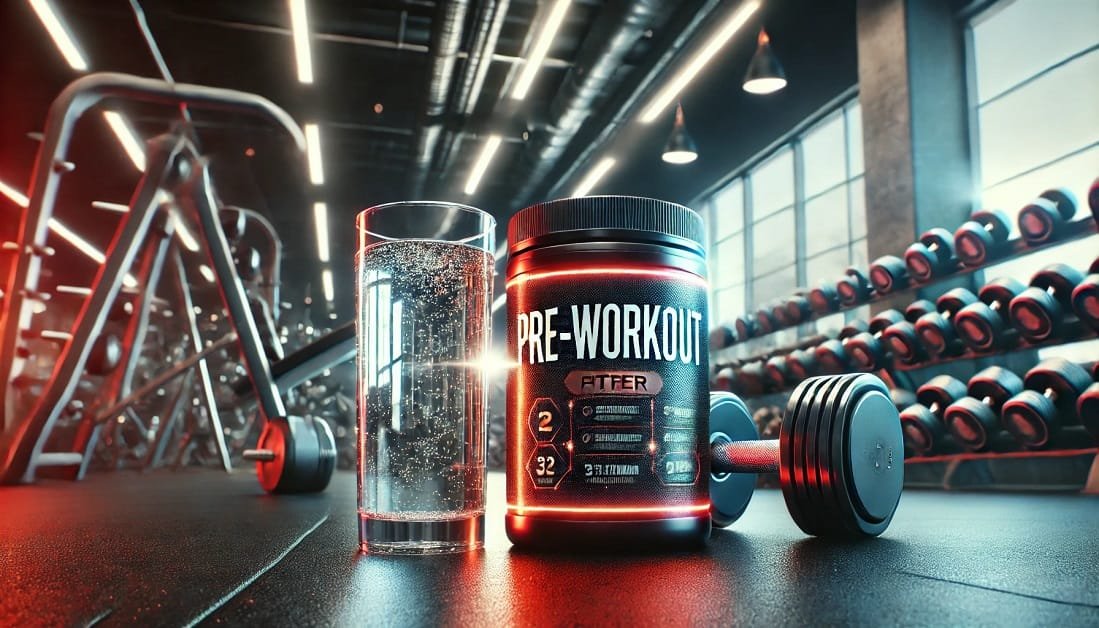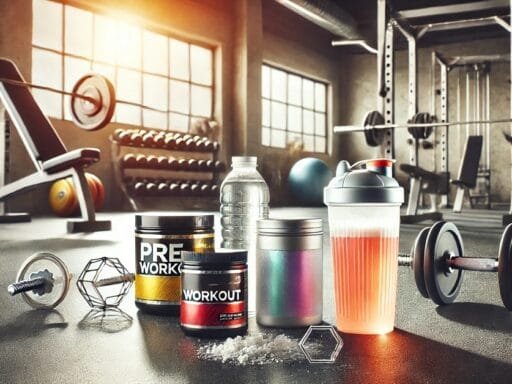1. Introduction: Understanding the Pre-Workout Itch
For fitness enthusiasts, pre-workout supplements are a go-to for boosting energy and enhancing performance during intense workouts. These supplements often contain a mix of ingredients designed to increase stamina, focus, and endurance. However, a common pre-workout side effect that many users experience is the itchy feeling from pre-workout. This pre-workout itch sensation can occur shortly after consuming the supplement, causing tingling or itching, especially on the face, arms, and neck.
If you’ve ever felt a sudden tingling or itching sensation after taking your pre-workout, you’re not alone. It’s a frequent experience that many people encounter, and while it’s often harmless, it can leave you wondering about its cause. Is it a sign of something more serious, or just an inevitable part of pre-workout supplementation?
In this blog, we’ll dive into the science behind the pre-workout itch, exploring why it happens, which ingredients might be causing it, and most importantly, how to manage it. Whether you’ve been curious about the tingling sensation or are trying to figure out how to minimize it, we’ve got all the answers you need!
Table of Contents
2. What is the Pre-Workout Itch?
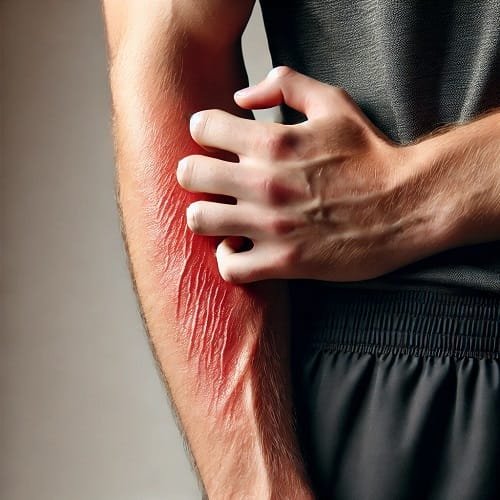
If you’ve ever experienced an itchy sensation after consuming a pre-workout supplement, you know how it can leave you scratching your head (or your arms). This pre-workout itching is a well-known side effect that occurs in many individuals, especially when they take certain types of pre-workout formulas. It usually appears as a mild tingling or itchy sensation, typically affecting areas like the face, arms, and neck. The intensity can vary, but it’s generally temporary and fades as your body adjusts.
The pre-workout itch response happens because of specific ingredients in the supplement, like beta-alanine and niacin, which are known to stimulate your body’s natural processes. As your body starts to metabolize these ingredients, blood vessels dilate, leading to increased blood flow near the surface of the skin. This surge in blood flow can trigger the sensation of tingling or itching, particularly in areas where the skin is more sensitive.
This pre-workout irritation often feels like a slight prickling or itching under the skin. Some people may experience it mildly, while others might feel a more intense response. It can be surprising at first, especially if you’re not familiar with this common pre-workout side effect. While it can be a little distracting or uncomfortable, it’s usually harmless and doesn’t indicate any serious issue.
The science behind this tingling sensation is primarily due to the way your body reacts to certain ingredients, particularly those that promote better circulation and endurance. While it may seem odd or even bothersome, the pre-workout itch is generally just a sign that the supplement is doing its job, increasing blood flow and preparing your body for the workout ahead.
3. Why Does Pre-Workout Make You Itch?

If you’ve ever taken a pre-workout supplement and experienced that sudden, surprising itchy feeling, you might wonder what exactly causes it. The answer lies in the active ingredients in many pre-workouts, particularly beta-alanine and niacin, both of which are well-known for their association with this common side effect. But why do these ingredients trigger pre-workout itching, and how does this sensation occur? Let’s break it down.
Beta-alanine is one of the primary ingredients responsible for the itching sensation experienced by many pre-workout users. When consumed, beta-alanine increases the concentration of carnosine in muscles, which helps buffer lactic acid during intense physical activity. However, beta-alanine also causes a histamine release in the body, which is part of an immune system response. Histamine is a chemical involved in allergic reactions and inflammatory responses. It can dilate blood vessels and increase blood flow, leading to the familiar tingling or itchy sensation on the skin. The more sensitive areas of the skin, such as the face, neck, and arms, are typically where this response is felt most intensely.
Another ingredient commonly found in pre-workout supplements that contributes to itchy feeling is niacin (vitamin B3). Niacin causes the blood vessels to dilate, which increases blood flow and can also result in a similar tingling or itching sensation. This process is known as flushing. The increased blood flow near the surface of the skin can lead to a feeling of warmth, redness, and sometimes an uncomfortable itch. Though it may seem alarming, this reaction is generally temporary and harmless.
The combined effect of these ingredients in pre-workout supplements triggers a pre-workout side effect that causes the skin to feel irritated or itchy. The histamine release combined with the increased blood flow results in a physical sensation that many people experience during their workout, particularly when the intensity picks up. While some users may experience this itchy sensation more intensely than others, it’s usually not a cause for concern.
To summarize, the pre-workout ingredients causing itch—primarily beta-alanine and niacin—cause this sensation by stimulating blood circulation and triggering histamine release. This, in turn, leads to the familiar feeling of tingling or itching that many people experience when using these supplements.
4. Common Ingredients That Cause the Pre-Workout Itch
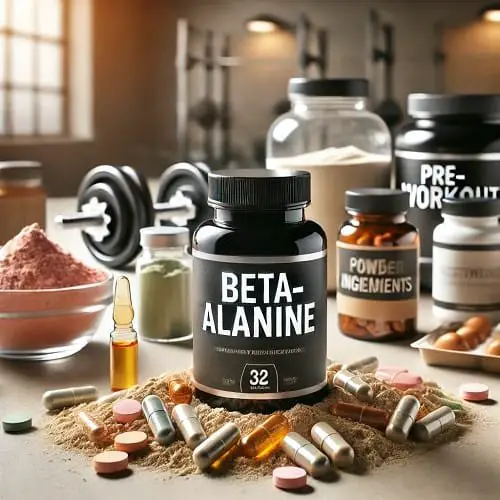
When it comes to pre-workout irritation, there are a few key ingredients that are often responsible for the itchy sensation many users experience. While not all pre-workout formulas will cause this effect, certain active compounds are more likely to trigger the pre-workout itch response. Let’s break down the main culprits.
1. Beta-Alanine: The Primary Cause of Itching
The most common ingredient associated with the pre-workout itch is beta-alanine. Known for its ability to buffer lactic acid in muscles, beta-alanine is a go-to for improving performance during intense workouts. However, it also has a tendency to cause a sensation of tingling or itching, which is due to its ability to trigger histamine release. When histamine is released into the bloodstream, it dilates blood vessels and increases blood flow, particularly near the skin’s surface. This causes the skin to feel tingly or itchy, especially in sensitive areas like the face, arms, and neck.
2. Niacin (Vitamin B3): Flushing and Itching
Another ingredient that frequently causes the itchy feeling from pre-workout is niacin, or vitamin B3. Niacin promotes vasodilation, meaning it helps expand the blood vessels to increase circulation. As blood rushes closer to the surface of the skin, it can result in flushing—a warm, red, and sometimes itchy sensation. This side effect is typically mild, but it can be uncomfortable, especially for those who are sensitive to niacin’s effects. The pre-workout itch sensation often comes from niacin’s ability to increase blood flow rapidly.
3. Caffeine and Creatine: Lesser Contributors
While beta-alanine and niacin are the primary suspects behind the pre-workout itch, other ingredients like caffeine and creatine may contribute to this sensation as well, albeit to a lesser extent. Caffeine, a well-known stimulant, can increase blood flow and stimulate the nervous system, which might heighten skin sensitivity for some individuals. Similarly, creatine, which helps improve strength and muscle endurance, can lead to an increase in water retention and blood volume, potentially causing mild irritation or itching in some users.
In summary, while beta-alanine and niacin are the main ingredients behind the pre-workout itch, other components like caffeine and creatine may also contribute. Understanding which ingredients cause this response can help you choose the right pre-workout supplement and manage the itchy sensation more effectively.
5. Is the Pre-Workout Itch Dangerous?

If you’ve ever experienced the itchy feeling from pre-workout, you might be wondering if it’s something to be concerned about. The good news is that, for most people, the pre-workout itch is a completely harmless side effect. While it can be uncomfortable or surprising at first, it’s generally temporary and poses no serious health risks.
The sensation is most often linked to the ingredients in pre-workout supplements, particularly beta-alanine and niacin, both of which trigger increased blood flow and histamine release. This leads to the familiar tingling or itching sensation, especially in areas like the face, arms, and neck. The discomfort tends to fade as your body adjusts to the supplement, and it’s rarely cause for concern. In fact, this pre-workout side effect is very common among regular supplement users.
RELATED POSTS
Does Pre-Workout Trigger Acne? Facts & Myths
Pre Workout vs Energy Drink: Which is Better for Your Workout?
Neck Harness Workout for Explosive Strength Gains
Ultimate Wrestling Workouts to Build Strength and Power
However, while the itch itself is not dangerous, there are a few situations where individuals might want to reconsider their pre-workout choice. If the itching becomes intense, lasts longer than usual, or is accompanied by other symptoms like dizziness, rash, or difficulty breathing, it could indicate an allergic reaction or sensitivity to a particular ingredient. In such cases, it’s important to stop using the supplement and consult with a healthcare professional.
For the majority of users, though, the pre-workout itch is simply a minor and temporary inconvenience. As long as you’re aware of the cause and it doesn’t lead to any serious reactions, it’s nothing to worry about.
6. How to Manage or Prevent Pre-Workout Itch
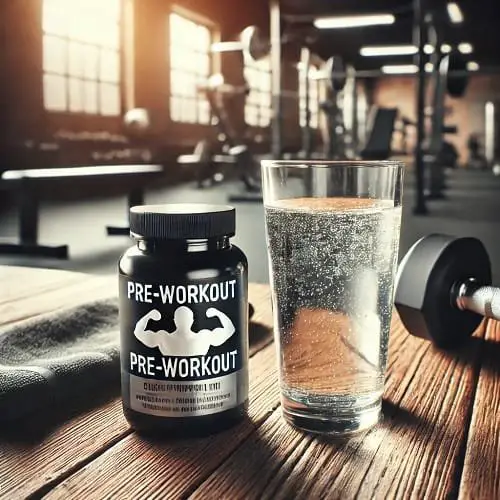
Experiencing the pre-workout itch can be annoying, but the good news is that there are several strategies you can use to manage pre-workout itch and reduce its intensity. If you find that this sensation is interfering with your workout, here are some practical solutions to consider.
1. Reduce Beta-Alanine Intake
One of the most common causes of pre-workout irritation is beta-alanine, which triggers the itchy feeling from pre-workout by increasing blood flow and releasing histamine. If you’re sensitive to this ingredient, try reducing your intake or switching to a formula with a lower dose of beta-alanine. Some pre-workout supplements offer “low-tingle” or “non-flushing” versions, which use less or no beta-alanine, helping to reduce itching.
2. Switch to Formulas Without Beta-Alanine
If you’re consistently bothered by the pre-workout itch, consider switching to a pre-workout supplement that doesn’t contain beta-alanine at all. There are plenty of pre-workout options that rely on other ingredients, like caffeine, creatine, or L-citrulline, to enhance performance without causing irritation. These formulas can still give you the energy and endurance benefits you need without triggering the uncomfortable tingling sensation.
3. Stay Hydrated
Another simple but effective way to manage pre-workout itch is to ensure you’re well-hydrated before taking your supplement. Dehydration can exacerbate pre-workout side effects, including the itching sensation. By drinking plenty of water before and after your workout, you can help your body process the ingredients more efficiently, reducing the likelihood of discomfort.
4. Reduce the Dose
If the itchy sensation is mild but still bothersome, try cutting back on your pre-workout dose. Some individuals are more sensitive to certain ingredients, and by lowering the amount you consume, you might reduce the pre-workout side effects. Gradually increasing the dose as your body adjusts could also help you find a balance that minimizes irritation while still providing performance benefits.
5. Choose Supplements with Minimal Irritation
Look for pre-workout supplements specifically formulated to minimize irritation. Many brands now offer “non-flushing” or “gentle” pre-workouts, designed to provide energy and focus without the tingling sensation. These formulas typically use ingredients like L-citrulline or caffeine instead of beta-alanine to deliver the same benefits but with less irritation.
By taking these steps, you can easily reduce itching and enjoy the benefits of your pre-workout supplement without the discomfort.
7. When to Be Concerned About Pre-Workout Itch
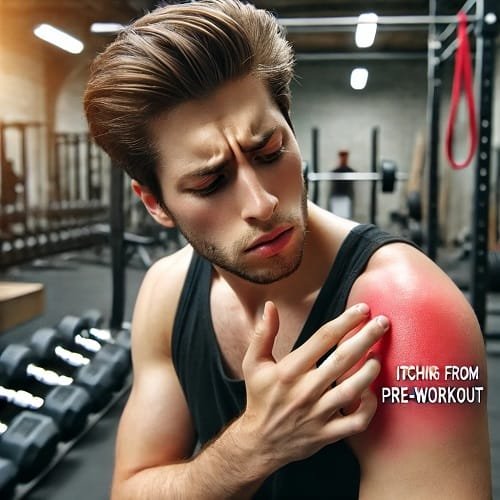
While the pre-workout itch is usually harmless, there are certain situations where the itching may be a sign of something more serious. It’s important to know when to be cautious and when to seek medical attention.
1. Excessive Redness or Swelling
In most cases, the itching from pre-workout is mild and temporary. However, if you experience extreme redness, swelling, or welts along with the itch, it may indicate a serious allergic reaction. This is especially true if the irritation spreads to other parts of the body, such as the chest, neck, or face. These signs could point to an allergic response to one of the pre-workout ingredients.
2. Difficulty Breathing or Tightness in the Chest
If you experience any difficulty breathing, a tight chest, or swelling in the throat along with the itching, you should seek immediate medical help. These symptoms may signal a more severe allergic reaction, like anaphylaxis, which requires urgent treatment.
3. Persistent or Worsening Symptoms
If the pre-workout itch continues for a prolonged period or worsens despite stopping the supplement, it’s time to reconsider your choice of pre-workout. Persistent symptoms could indicate sensitivity or intolerance to certain ingredients, and medical advice may be necessary to identify the cause.
In summary, while pre-workout side effects like itching are usually mild, it’s crucial to stay alert for signs of a serious allergic reaction. If symptoms worsen or are accompanied by other troubling signs, don’t hesitate to seek medical attention.
8. Conclusion: Embrace the Pre-Workout Itch
In conclusion, the pre-workout itch is a common and manageable sensation that many users experience. While it can be a bit startling at first, it’s a sign that the pre-workout ingredients causing itch are effectively doing their job, boosting blood flow and enhancing your workout performance. For most people, this pre-workout itch response is temporary and fades quickly as your body adjusts to the ingredients.
Remember, these pre-workout side effects are not harmful but rather a natural part of how certain ingredients, like beta-alanine and niacin, work to improve your physical endurance. The good news is that there are several ways to manage the pre-workout itch, including adjusting dosages, hydrating properly, and even switching to a formula with minimal irritants. You can experiment with different pre-workouts until you find one that best fits your body’s needs, offering the desired benefits without the discomfort.
So, next time you feel that tingling sensation, rest assured that it’s simply your body responding to the boost in circulation. With the right adjustments, the pre-workout itch can become just another manageable part of your fitness journey.
9. Frequently Asked Questions (FAQ)
Q1: Why does beta-alanine cause an itch in pre-workouts?
Beta-alanine is known to increase blood flow and stimulate histamine release, which can lead to a pre-workout itching sensation. This is a common response, especially in sensitive individuals.
Q2: Can niacin cause a pre-workout itch?
Yes, niacin is another ingredient that can cause a pre-workout itch. It increases blood circulation and dilates blood vessels, which can lead to the familiar itchy feeling.
Q3: How can I reduce the itching from pre-workout?
To reduce pre-workout itching, you can lower your beta-alanine intake, stay hydrated, or switch to pre-workouts without ingredients known to cause irritation, like beta-alanine or niacin.
Q4: Is the pre-workout itch a sign that the supplement is working?
Yes, the pre-workout itch is often a sign that the supplement is having its intended effect. Ingredients like beta-alanine and niacin increase blood flow and enhance circulation, which can result in the tingling or itching sensation. While not everyone experiences it, for those who do, it’s typically a sign that the body is responding to the supplement.
Q5: Can I experience the pre-workout itch if I have sensitive skin?
Yes, individuals with sensitive skin may be more prone to experiencing the itching from pre-workout. The ingredients in the supplement that cause increased blood flow, such as beta-alanine or niacin, can trigger skin irritation in sensitive individuals. If you have sensitive skin, it’s best to try lower doses or opt for a formula with fewer irritants.
Q6: How long does the pre-workout itch last?
The pre-workout itch is usually a temporary sensation that lasts anywhere from 10 to 30 minutes after taking the supplement. For most people, the itching fades as the body adjusts to the ingredients. However, if the sensation persists or becomes uncomfortable, it might be worth exploring alternative pre-workout formulas with fewer irritants.

